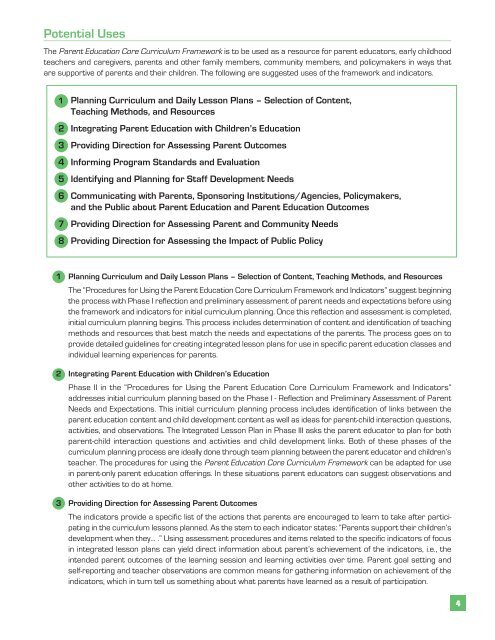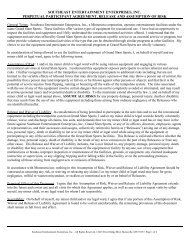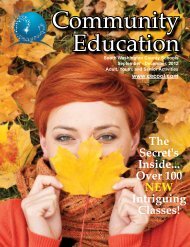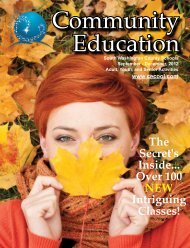Parent Education Core Curriculum Framework 2011.pdf - mnafee
Parent Education Core Curriculum Framework 2011.pdf - mnafee
Parent Education Core Curriculum Framework 2011.pdf - mnafee
You also want an ePaper? Increase the reach of your titles
YUMPU automatically turns print PDFs into web optimized ePapers that Google loves.
Potential Uses<br />
The <strong>Parent</strong> <strong>Education</strong> <strong>Core</strong> <strong>Curriculum</strong> <strong>Framework</strong> is to be used as a resource for parent educators, early childhood<br />
teachers and caregivers, parents and other family members, community members, and policymakers in ways that<br />
are supportive of parents and their children. The following are suggested uses of the framework and indicators.<br />
1 Planning <strong>Curriculum</strong> and Daily Lesson Plans – Selection of Content,<br />
Teaching Methods, and Resources<br />
2 Integrating <strong>Parent</strong> <strong>Education</strong> with Children’s <strong>Education</strong><br />
3 Providing Direction for Assessing <strong>Parent</strong> Outcomes<br />
4 Informing Program Standards and Evaluation<br />
5 Identifying and Planning for Staff Development Needs<br />
6 Communicating with <strong>Parent</strong>s, Sponsoring Institutions/Agencies, Policymakers,<br />
and the Public about <strong>Parent</strong> <strong>Education</strong> and <strong>Parent</strong> <strong>Education</strong> Outcomes<br />
7 Providing Direction for Assessing <strong>Parent</strong> and Community Needs<br />
8 Providing Direction for Assessing the Impact of Public Policy<br />
1 Planning <strong>Curriculum</strong> and Daily Lesson Plans – Selection of Content, Teaching Methods, and Resources<br />
The “Procedures for Using the <strong>Parent</strong> <strong>Education</strong> <strong>Core</strong> <strong>Curriculum</strong> <strong>Framework</strong> and Indicators” suggest beginning<br />
the process with Phase I reflection and preliminary assessment of parent needs and expectations before using<br />
the framework and indicators for initial curriculum planning. Once this reflection and assessment is completed,<br />
initial curriculum planning begins. This process includes determination of content and identification of teaching<br />
methods and resources that best match the needs and expectations of the parents. The process goes on to<br />
provide detailed guidelines for creating integrated lesson plans for use in specific parent education classes and<br />
individual learning experiences for parents.<br />
2 Integrating <strong>Parent</strong> <strong>Education</strong> with Children’s <strong>Education</strong><br />
Phase II in the “Procedures for Using the <strong>Parent</strong> <strong>Education</strong> <strong>Core</strong> <strong>Curriculum</strong> <strong>Framework</strong> and Indicators”<br />
addresses initial curriculum planning based on the Phase I - Reflection and Preliminary Assessment of <strong>Parent</strong><br />
Needs and Expectations. This initial curriculum planning process includes identification of links between the<br />
parent education content and child development content as well as ideas for parent-child interaction questions,<br />
activities, and observations. The Integrated Lesson Plan in Phase III asks the parent educator to plan for both<br />
parent-child interaction questions and activities and child development links. Both of these phases of the<br />
curriculum planning process are ideally done through team planning between the parent educator and children’s<br />
teacher. The procedures for using the <strong>Parent</strong> <strong>Education</strong> <strong>Core</strong> <strong>Curriculum</strong> <strong>Framework</strong> can be adapted for use<br />
in parent-only parent education offerings. In these situations parent educators can suggest observations and<br />
other activities to do at home.<br />
3 Providing Direction for Assessing <strong>Parent</strong> Outcomes<br />
The indicators provide a specific list of the actions that parents are encouraged to learn to take after participating<br />
in the curriculum lessons planned. As the stem to each indicator states: “<strong>Parent</strong>s support their children’s<br />
development when they… .” Using assessment procedures and items related to the specific indicators of focus<br />
in integrated lesson plans can yield direct information about parent’s achievement of the indicators, i.e., the<br />
intended parent outcomes of the learning session and learning activities over time. <strong>Parent</strong> goal setting and<br />
self-reporting and teacher observations are common means for gathering information on achievement of the<br />
indicators, which in turn tell us something about what parents have learned as a result of participation.<br />
4





